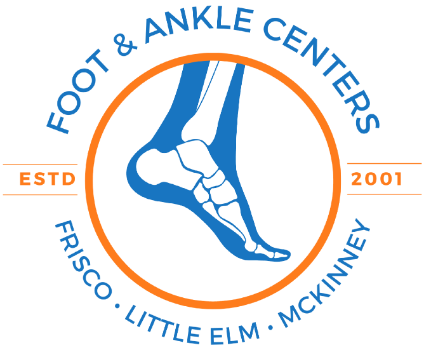Our Expert Podiatrists Can Identify & Treat Your Feet's Skin Rashes
Our podiatrists at Foot & Ankle Centers of Frisco, Little Elm, & McKinney understand how painful and embarrassing foot rashes can be. Here we are dedicated to providing our patients with the best care possible. Our podiatrists will address the underlying cause of the rash, as well as provide relief from the itchy, burning, and soreness that can come with it.

Other Skin Rashes That Our Expert Podiatrist Can Treat
Psoriasis
Foot psoriasis is a chronic skin condition due to an autoimmune disorder that is often inherited. The most common symptom of foot psoriasis is red, scaly patches on the feet. These patches are usually itchy and can be painful. The patches may be anywhere on the feet, but they are most commonly found on the soles and toes. Other symptoms may include thickening of the skin, cracking of the skin, and blisters.
Our podiatrists can prescribe topical ointments, such as corticosteroid creams, to help reduce inflammation and relieve the itching and burning associated with psoriasis. It is important to note that while treatments may help to reduce symptoms and improve quality of life, there is no cure for foot psoriasis. Therefore, it is important to take steps to prevent flare-ups. This includes avoiding triggers such as stress and infection, using moisturizers to keep the skin hydrated, and wearing shoes and socks that protect the feet from irritation.
Contact Dermatitis
Foot contact dermatitis is an inflammatory skin condition caused by direct contact with an allergen or irritant. This irritant may be an ingredient in a shoe, a chemical in a detergent, specific fabric materials, or a plant in your garden. When this irritant touches your foot's skin, it triggers an allergic reaction in which your body releases inflammatory chemicals, leading to red, itchy, and inflamed skin. Other symptoms may include dry, cracked skin; swelling; and blisters or bumps. The rash can be painful and may ooze clear or yellow fluid.
At Foot & Ankle Centers, our podiatrists can diagnose the condition by taking a detailed medical history and examining your feet. Your podiatrist may also order a skin biopsy to determine the cause of your rash. Treatment will be focused on preventing the rash from spreading further and bringing down the inflammation. Your treatment plan may include prescription topical creams or oral medication.
Eczema
Foot eczema is a skin condition that results in red, scaly, and itchy patches on the feet. It is caused by an overactive immune system that is responding to allergens or irritants. Common triggers for foot eczema include contact with irritants such as detergents, perfumes, and chemicals, as well as contact with allergens like dust mites, mold, and pet dander. Additionally, foot eczema can be caused by wearing shoes that are too tight or that don’t fit correctly.
Our podiatrists at Foot & Ankle Centers can help you identify any triggers and create a plan to avoid any triggers. For example, if your eczema is caused by a chemical or irritant, you should switch to more natural products that are free of harsh chemicals. Additionally, it is important to wear shoes that fit properly and to keep your feet clean and dry. To help alleviate any discomfort, your podiatrist may prescribe a cream or oral medication to reduce inflammation and itching.
Fungal Infections
Besides athlete's foot, other types of fungal infections include jock itch, ringworm, and yeast infections. Many patients will experience symptoms of redness, itching, and burning of the skin on the feet and sometimes blisters or sores may appear. All forms of fungi thrive in moist, warm environments and can easily spread from person to person through direct contact or contact with contaminated objects.
It is important to seek medical help right away from one of our podiatrists at Foot & Ankle Centers of Frisco, Little Elm, & McKinney if you have any of these symptoms. Many fungal infections will spread quickly on your foot and require prescription-strength topical antifungal medications or oral antifungal medications to eliminate the fungus. If the fungal infection is not properly treated, your foot could develop nerve damage, ulcers, secondary bacterial infections, and even amputation of the foot.
